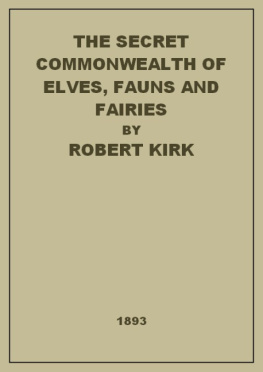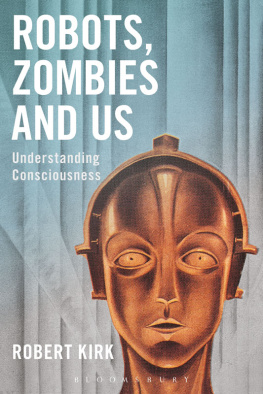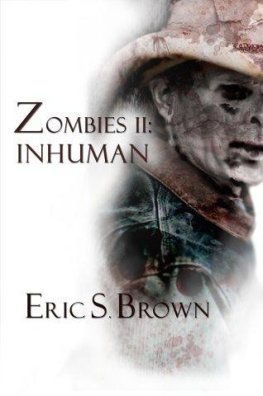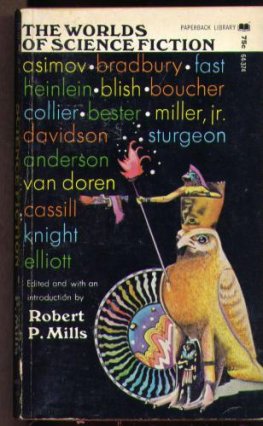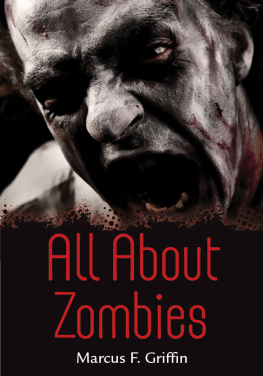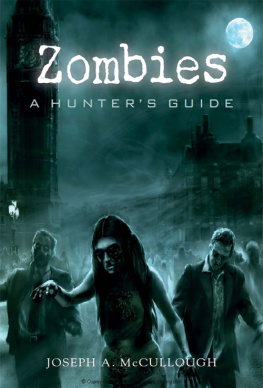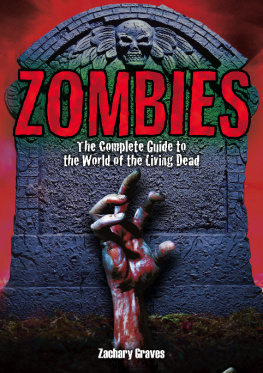
ZO M B I E S A N D C O N S C I O U S N E S S
This page intentionally left blank
Zombies and
Consciousness
RO B E RT K I R K
CLARENDON PRESS OXFORD
Great Clarendon Street, Oxford OX2 6DP
Oxford University Press is a department of the University of Oxford.
It furthers the Universitys objective of excellence in research, scholarship,
and education by publishing worldwide in
Oxford New York
Auckland Cape Town Dar es Salaam Hong Kong Karachi
Kuala Lumpur Madrid Melbourne Mexico City Nairobi
New Delhi Shanghai Taipei Toronto
With offices in
Argentina Austria Brazil Chile Czech Republic France Greece
Guatemala Hungary Italy Japan Poland Portugal Singapore
South Korea Switzerland Thailand Turkey Ukraine Vietnam
Oxford is a registered trade mark of Oxford University Press
in the UK and in certain other countries
Published in the United States
by Oxford University Press Inc., New York
Robert Kirk 2005
The moral rights of the author have been asserted
Database right Oxford University Press (maker)
First published 2005
All rights reserved. No part of this publication may be reproduced,
stored in a retrieval system, or transmitted, in any form or by any means,
without the prior permission in writing of Oxford University Press,
or as expressly permitted by law, or under terms agreed with the appropriate
reprographics rights organization. Enquiries concerning reproduction
outside the scope of the above should be sent to the Rights Department,
Oxford University Press, at the address above
You must not circulate this book in any other binding or cover
and you must impose the same condition on any acquirer
British Library Cataloguing in Publication Data
Data available
Library of Congress Cataloging in Publication Data
Kirk, Robert, 1933
Zombies and consciousness / Robert Kirk.
p. cm.
1. Consciousness.
2. ZombiesMiscellanea.
3. Other minds (Theory of
knowledge)
4. Mind and body.
5. Materialism.
I. Title.
B808.9.K58 2005
126dc22
2005020194
Typeset by Newgen Imaging Systems (P) Ltd., Chennai, India
Printed in Great Britain
on acid-free paper by
Biddles Ltd., Kings Lynn, Norfolk
ISBN 0199285489
9780199285488
1 3 5 7 9 10 8 6 4 2
To Fay
This page intentionally left blank
Preface
Zombies (the philosophical sort: this is not about voodoo) would be exactly like us
in all physical and behavioural respects, but completely without consciousness. This
seductive idea threatens the physicalist view of the world dominant in philosophy
and science today. It has led a number of philosophers to reject physicalism and take up dualism. More surprisingly, it has beguiled many physicalists, who now feel
forced to defend increasingly convoluted explanations of why the conceivability of
zombies is compatible with their impossibility. But the zombie idea is a major source of confusion and distorted thinking.
I have two aims in this book. One is to dispose of the zombie idea once and
for all. There are plenty of objections to it in the literature, but they lack intuitive appeal. I have an argument which I think demolishes it in a way that is intuitively
appealing as well as cogent. The other aim is to set out an explanation of what it is to be phenomenally conscious. Both aims need to be pursued in the same work,
since the anti-zombie argument on its own would have left us still wondering how
on earth there could be such a thing as phenomenal consciousness; while my
account of consciousness is in the end dependent on the anti-zombie argument.
Three things about my approach are distinctive, I think. One is the argument
showing that zombies are inconceivable. Another is the attention given to
humbler creatures than ourselves, which helps to avoid some of the distracting
complications of our exceptionally sophisticated forms of cognition. The third is
my development of the notion of a basic package of capacities to pick out a
special class of creatures: deciders. When this idea is properly de-sophisticated, it makes a solid conceptual framework for an account of the crucial feature: direct
activity.
I hope the book will appeal to anyone seriously interested in problems of
consciousness: not only to professional philosophers, research students, and
philosophy undergraduates, but to zoologists, psychologists, and neuroscientists
tackling the empirical questions which consciousness raises.
I am grateful to colleagues and students at Nottingham for stimulating
discussions of these topics over many years; to Ned Block, Peter Carruthers, and
David Chalmers, who kindly read the whole or parts of a draft and generously
offered very helpful comments and suggestions; and to OUPs two anonymous
readers for their constructive suggestions. I would specially like to thank Bill Fish for acute detailed comments on the entire draft, and Janet, my wife, for unfailing
encouragement and support.
R. K.
April 2005
This page intentionally left blank
Contents
x
Contents
Contents
xi
xii
Contents
A cook was charged with cruelty to animals. He had put live prawns on a hot
plate, where they wriggled and writhed, apparently in pain. The case was dropped
because it proved impossible to get expert advice on whether or not prawns could
feel pain. Although the prawns behaviour made it easy to suppose they were really
suffering, perhaps there was no more to it than behaviourperhaps they really
had no sensations at all, any more than a twisted rubber band, writhing as it
unwinds, has sensations. Perhaps there was nothing it was like for the prawns.
Can we make progress in this area? I think so, provided we resist some seductive
but radically mistaken ways of thinking. The philosophical idea of zombies is the
most dramatic manifestation of these, highly significant in spite of its strangeness.
There is much to be said for the view that the seeming possibility of zombies
entails the falsity of physicalism; and it matters whether physicalism is true. Even
more importantly, I think, the zombie idea reflects a fundamentally wrong con
ception of consciousness and provokes much misguided theorizing. In this book
I have two main aims. One is to expose the incoherence of the zombie idea in what
I think is a cogent and intuitively appealing way. The other is to build on that
result to develop a fresh approach to phenomenal consciousness: to explaining
how there can be such a thing as what it is like.
It is easy to imagine that prawns feel pain. And since they have eyes and other
sense organs, it is easy to imagine they are capable of other kinds of phenomenal
consciousness too. (Expressions like phenomenal consciousness will be examined
later.) It is also easy to imagine that they dont feel pain but only behave as if they did, and that they have no conscious perceptual experiences at all. Regardless of
what we might be able to imagine, though, there is surely a matter of fact to be
right or wrong about. Either there is something it is like for a creature or there
isnt, or so we tend to assume. In our own case, surely there is. I might pretend to
have toothache when I dont; but sometimes I really do have toothacheand lots
Next page

